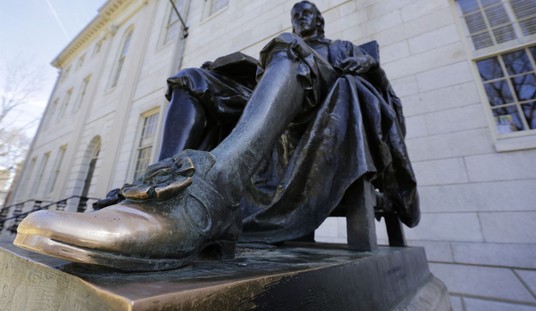The rhetoric coming from climate scolds in the media just seems to get more outlandish by the day. We've reported in the past how emissions of methane from cows are apparently a desperate issue if you believe these folks. But then, everything seems to be a desperate issue with climate scolds these days - except, perhaps, for Leonardo DiCaprio's mega-yacht, the Obamas' oceanfront mansion, or John Kerry's private jet.
Intellectual consistency isn't a really high priority for these people. But then, that seems to be a hallmark of the left these days.
This brings us to the leftist outlet Vox, who has been reporting some evaluation of cow "emissions," and doing a little panic-mongering into the bargain. The problem? They predictably get almost everything wrong. On the "Climate Realism" website, the Arthur B. Robinson Center on Climate and Environmental Policy's Linnea Lueken has the receipts.
A recent article at Vox, titled “Scientists are measuring burps and farts. It could help save the planet,” claims that methane produced by farm animals is causing dangerous global warming, and thus that reducing agriculture-related methane is critical to limiting warming to the 1.5°C target established for political ends in the 2015 Paris climate agreement. This is false. Animal related methane is not a threat to the environment, contributing little if anything to global warming.
Part of what Vox doesn't understand (and that's a lengthy list) involves the nature of methane and its half-life in the atmosphere - which, one would think, would be something that should be added to the evaluation.
Although methane is, as Vox says, a “powerful” greenhouse gas with much more warming potential per molecule than carbon dioxide, it has a short atmospheric life as so plays a relatively minor role in the atmosphere when it comes to long-term warming. NASA, one source for Vox’s story admits as much. What Vox and NASA neglect to mention, however, is that methane’s absorption bands occur at wavelengths that the most powerful and abundant greenhouse gas, water vapor, making up as much of 97 percent of the greenhouse gasses in the atmosphere, already covers. Methane, a small trace gas, is a very minor player despite alarmism surrounding it.
The "study" Vox cites is measuring emissions from cattle, but that's only one part of the picture. Sure, cattle produce some methane; believe you me, I worked summers in my uncle's livestock auction barn and I can attest to that. In fact, methane, when you're dealing with a lot of cattle in the confined temporary quarters of an auction barn, is the least of your worries. At least one doesn't have to shovel methane.
Back to Vox: The question that they should be asking (but don't) is "What happens to that methane?"
But even if we only consider the amount of methane emitted from the critters that provide us with milk, cheese, and beef, that's still only part of the story. Monoculture plant agriculture also produces methane, and natural sources, even more so. This has been known for decades. Beef production in particular only represents about 2 percent of methane emissions.
But beef production only represents 2 percent of all U.S. greenhouse gas emissions, and is beaten out in emissions by crop agriculture, which contributes 10.2 percent of U.S. emissions. These numbers are likely similar in most western countries. Climate Realism has covered these facts multiple times before, here, here, and here, for example. The facts haven’t changed, yet climate alarmists arguments are never revised or improved.
Vox isn't citing science in this article. They are engaging in panic-mongering. They are virtual Chicken Littles, shouting that the sky will fall unless we presumably stop raising cattle for beef and the other good things cattle produce. Well, I'm sorry, but I'm not giving up anything like that lovely bacon cheeseburger I had for lunch yesterday.
See Related: Crisis in Europe: Dairy Cow Emissions!
New US Government Report: Climate Change 'Not an Existential Threat' to Humanity
The fact is that Vox, like all publications and organizations that indulge in climate-scoldery, are cherry-picking data to prove a point; they cite people who are working backward from a conclusion. They cite non-scientific sources, like the "International Energy Agency." They lack the requisite curiosity to do anything remotely like science reporting; it never occurs to them to ask the question, "What happens next?" that is essential in doing actual science.
Especially in this case, where Vox has worked itself into a tizzy over cow emissions, when if they had asked "What happens next," and learned that the fact-based answer is "Not much," they could have saved the time and bandwidth taken up by this horse squeeze.
So, enjoy your Sunday roast beef. The climate will look after itself.















